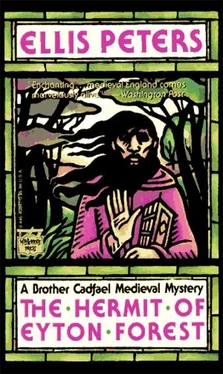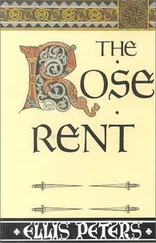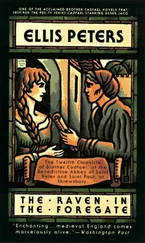“I’ve not seen you these two days,” said Cadfael, eyeing the traces of old violence and alert for new. “Come round with me into the herb garden, and let me dress that gash again for you. He’s safely away for an hour or two, I take it, you can breathe easily. And it would do with another treatment, though I see it’s clean now.”
Warin hesitated only for a moment. “They’ve taken the two fresh horses, and left me the others to groom. But they can wait a while.” And he went willingly at Cadfael’s side, his lean person, a little withered before its time, seeming to expand in his lord’s absence. In the pleasant aromatic coolness of the workshop, under the faintly stirring herbs that rustled overhead, he sat eased and content to let his injury be bathed and anointed, and was in no hurry to get back to his horses even when Cadfael had done with him.
“He’s hotter even than the old one was on Brand’s heels,” he said, shaking a helpless but sympathetic head over his former neighbour’s fortunes. “Torn two ways, between wanting to hang him and wanting to work him to death for greed, and it isn’t whether or not Brand killed the old lord that will determine which way the cat jumps, for there was no great love lost there, neither. Not much love in all that household to be gained or lost. But good haters, every one.”
“There are more of them?” Cadfael asked with interest, “Drogo has left a widow?”
“A poor pale lady, all the juice crushed out of her,” answered Warin, “but better born than the Bosiets, and has powerful kin, so they have to use her better than they use anyone else. And Aymer has a younger brother. Not so loud nor so violent, but sharper witted and better able to twist and turn. That’s all of them, but it’s enough.”
“Neither one of them married?”
“Aymer’s had one wife, but she was a sickly thing and died young. There’s an heiress not far from Bosiet they both fancy now—though by rights it’s her lands they fancy. And if Aymer is the heir, Roger’s far the better at making himself agreeable. Not that it lasts beyond when he gets his way.” It sounded a poor outlook for the girl, whichever of the two got the better of the contest, but it also sounded one possible reason why Aymer should not loiter here too long, or he might lose his advantages at home. Cadfael felt encouraged. Absence from a newly-inherited honour might even be dangerous, if there was a clever and treacherous younger brother left behind there to make calculated use of his opportunities. Aymer would be bearing that in mind, even while he grudged giving up his vindictive pursuit of Hyacinth. Cadfael still could not think of the boy as Brand, the name he had chosen for himself fitted him so much better. “I wonder,” said Warin, unexpectedly harking back to the same elusive person, “where Brand really got to? Lucky for him we did give him some grace—not that my lord intended it so!—for at first they thought that a man with the skill he had at his finger-ends would surely make for London, and we wasted a week or more searching all the roads south. We got beyond Thame before one of his men came riding after us, saying Brand had been seen in Northampton. If he’d started off northwards, Drogo reckoned he’d continue so, and likely to bear west as he went, and make for Wales. I wonder has he reached it. Even Aymer won’t follow him over the border.”
“And you picked up no more sightings of him along the way?” asked Cadfael.
“No, never a trace. But we’re far out of the country where anyone would know him, and not everybody wants to get tangled into such a business. And he’ll have taken another name, for sure.” Warin rose, refreshed but reluctant, to go back to his duties. “I hope it may stand him in good stead. No matter what the Bosiets say, he was a decent lad.”
Brother Winfrid was busy sweeping up leaves under the orchard trees, for the moist autumn had caused them to fall before they took their bright seasonal colouring, in a soft green rain that rotted gently into the turf. Cadfael found himself alone and without occupation after Warin had left him. The more reason to sit down quietly and think, and a prayer or two wouldn’t come amiss, either, for the boy who had gone rushing off on his black pony, on his self-appointed, mad and generous mission, for the rash young man he had set out to save, even for the hard, malignant lordling cut off without time for penitence or absolution, and bitterly in need of grace.
The bell for Vespers called him out of his musings, and he went gladly to answer it, out through the gardens and across the court to the cloister and the south door of the church, to be early in his place. In the past few days he had missed all too many services, he was in need of the reassurance of brotherhood. There were always a few of the people of the Foregate at Vespers, the devout old women who inhabited some of the abbey’s grace houses, elderly couples retired and happy to fill up their leisure and meet their friends at church, and often guests of the house coming back from the activities of the day. Cadfael heard them stirring beyond the parish altar, in the vast spaces of the nave. Rafe of Coventry, he noted, had come in from the cloister and chosen a place from which he could see within, past the parish altar and into the choir. Kneeling at prayer, he had still that quiet composure about him, a man secure and at peace with his own body, and wearing his inscrutable face rather as a shield than as a mask. So he had not yet moved on to contact those suppliers of his in Wales. He was the only worshipper from the guest hall. Aymer Bosiet must be still about his funereal business in the town, or else beating the coverts in field and forest somewhere after his runaway.
The brothers came in and took their places, the novices and schoolboys followed. There was a bitter reminder there, for their numbers were still one short. There was no forgetting about Richard. Until he was recovered there would be no peace of mind, no lightness of heart, for any of those children. At the end of Vespers Cadfael lingered in his stall, letting the procession of brothers and novices file out into the cloister without him. The office had its beauty and consolation, but the solitude afterwards was also salutary in its silence, after the echoes of the music had all died away, and to be here alone in this evening hour had a special beneficence, whether because of the soft, dove-coloured light or the sense of enlargement that seemed to swell the soul to inhabit and fill the last arches of the vault, as a single drop of water becomes the ocean into which it falls. There was no better time for profound prayer, and Cadfael felt the need of it. For the boy in particular, equally solitary somewhere, perhaps afraid. It was to Saint Winifred Cadfael addressed his plea, a Welshman invoking a Welsh saint, and one to whom he felt very close, and for whom he had an almost family affection. Herself hardly more than a child at her martyrdom, she would not let harm come to another threatened child. Brother Rhun, whom she had healed, was carefully trimming the scented candles he made for her shrine when Cadfael approached, but he turned his fair young head towards the petitioner, gave him one glance of his aquamarine eyes, that seemed to have their own innate light, and smiled and went away. Not to linger and complete his work when the prayers ended, not to hide in the shadows and watch, but clean away out of knowledge, on swift, agile, silent feet that had once gone lamely and in pain, to leave the whole listening vault ready to receive the appeal in its folded hands, and channel it aloft. Cadfael arose from his knees comforted, without knowing or asking why. Outside, the light was fading rapidly, and here within, the altar lamp and Saint Winifred’s perfumed candles made small islands of pure radiance in a great enfolding gloom, like a warm cloak against the frost of the outside world. The grace that had just touched Cadfael had a long enough reach to find Richard, wherever he was, deliver him if he was a prisoner, console him if he was frightened, heal him if he was hurt. Cadfael went out from the choir, round the parish altar and into the nave, sensible of having done what was most needful, and content to wait patiently and passively until grace should be manifested. It seemed that Rafe of Coventry had also had solemn and personal prayers to offer, for he was just rising from his knees in the empty and silent nave as Cadfael came through. He recognised his acquaintance of the stable yard with a shadowed but friendly smile, that came and went briefly on his lips but lingered amiably in his eyes.
Читать дальше












